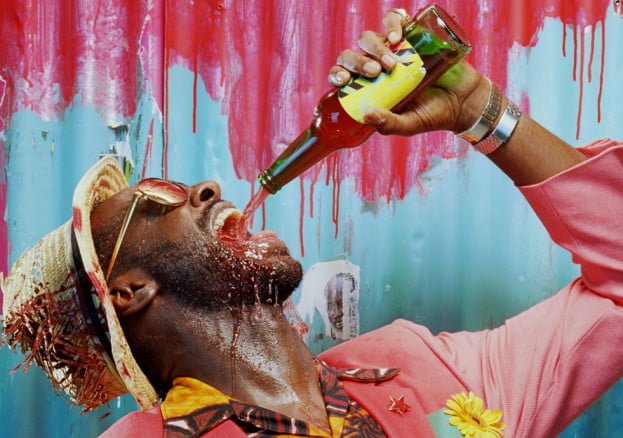Review: They Drink It In The Congo @ the Almeida Theatre
August 25, 2016

Photo credit: Miles Aldridge
Leave your guilt at home. There’s enough of it to go around, as we are briefly reminded by one of the players at lights up. A reminder of our own contribution to the stolen lives and wealth of those in the Democratic Republic of the Congo. “Not mine!” you might say. But the proof is in our belongings: our phones, tablets, electronics – all products of the Congolese harvest.
In Adam Brace’s truly pressing, present, and current play, we hear a cry for help. Not from the hushed voices of the victims of the political unrest in the DRC, but from Stef, a British woman wanting to do good and remedy the pain she saw there. She plans a festival to raise awareness and unite the London Congolese, providing a platform so tell people what she knows. But before long is forced to come to terms with the scale of the problem, and the fact that she contribute little to its resolution. She will not heal the people’s wound as she had thought, hoped, needed – not with just a plaster.

Photo credit: Marc Brenner
Her burden is an ever-present one, represented by Oudry (brilliantly performed by Sule Rimi), Stef’s accompaniment throughout the play, a ‘note-to-self’ of why she’s organising the event. He is the person – the people – she couldn’t help. Her supporters have many individual stories, and the tales of the Congolese diaspora have their own unique importance. Some characters are victims, some are doing what they can to send money home. But leaving the DRC has not meant leaving its problems. The unrest follows them – ‘Les combattants’ – whom we meet during proceedings. Fearsome political activists. Not villains. They are people wanting change, just like Stef.
Brace makes sure to school us on the facts, too: the money, the colonisation, the history, the resources. Among those resources is Coltan, a metallic ore mined in the DRC and the source of much conflict, and the subject is expanded on in the play’s programme, an accompanying textbook for the night.

Photo credit: Marc Brenner
Whilst I use my device to search for that juice drink advert from which the play’s title takes inspiration, I cannot help but feel insignificant. What can I actually do to make a difference, to change things? I don’t know. It wouldn’t be hard to ignore Stef’s festival, but it is hard to forget the gaping hole left by a mine, a physical reminder of a quest for minerals, the country’s wound.
They Drink It In The Congo was a feat to observe, or perhaps a pleasure to watch, but this way of viewing the work feels a touch too ‘us and them’. The settings felt familiar yet fresh, inviting and uncomfortable. The stage was a vehicle, connecting the two worlds of the DRC and the UK magnificently, forcing us to adopt a new perspective instead of just ignoring the problem, as we could readily ignore a festival like Stef’s.
The action was vibrant and on its toes, alive. I was in amongst it. At a safe distance, though. Should I feel guilty for wanting to stay at arm’s length? Again, the same question: what can we do to make things better? We must start somewhere, mustn’t we? A plaster can’t hurt…

Comments